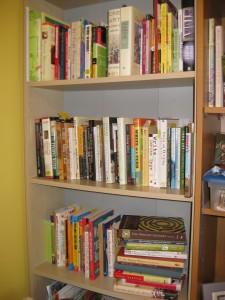#WritersRead: On Writing by Rochelle Melander
 Part memoir, part writing craft, Stephen King’s book On Writing will stir every writer’s heart and erase any doubt you had about King being a serious writer (he is). My favorite tip from King’s book is this gem:
Part memoir, part writing craft, Stephen King’s book On Writing will stir every writer’s heart and erase any doubt you had about King being a serious writer (he is). My favorite tip from King’s book is this gem:
If you want to be a writer, you must do two things above all others: read a lot and write a lot. There’s no way around these two things that I’m aware of, no shortcut. —Stephen King, On Writing, p. 145
Warning: I might rant a bit now. I have met many people who want to be famous authors who rarely read. Writers, that’s like being a shoe designer and never checking out the competitor’s shoes. Unless the designer studies the market, how does she know that there are already plenty of designers doing ballet flats but not enough doing fisherman’s sandals? Like any other business, in order to be successful in the book business, you need to know and understand your competition. Here’s why:
*Reading good books will teach you how to write better. We learn by watching the masters do it well—whether it is cooking, yoga, or writing. Whenever you have a question about how to do something in a book—other books can be your models and teachers.
*Reading books in your field or genre will help you to create a book that can match or beat the competition. Writing a mediocre book will not help you or your business. When you read books, always ask yourself how yours can be better or different.
*Reading books in your field or genre, published by the best publishers, will teach you what the market wants. Pay attention to what sells—that tells you what readers are looking for.
Here’s today’s takeaway: writers who publish and sell successfully write and read a lot. If they make it look easy, it is because they have worked hard at it. As Nathaniel Hawthorne said, “Easy reading is damn hard writing.”
If you want to be a writer, whether this will be your career or a way of communicating your message, commit to doing two actions: read and write daily. These are the writer’s equivalent to doing scales. Like King, I know of no shortcuts.
Now it’s your turn: what lessons did you takeaway from King’s book, On Writing? Please leave them below!









I just love this book! I think weaving his memior into the pages helped me relate better to him as a “regular person”. I can read a million books on how to write that may convey the same types of techniques or ideas – but they don’t resonate as well without the story behind it. The image King painted of himself at his desk writing to me was powerful.
He had some lengthy discussion about symbolism and theme in the book. I tend to force such things, so I enjoyed his take on it:
“….you’ll see if symbolism, or the potential for it, exists. If it doesn’t, leave well enough alone. If it does, however-if it’s clearly a part of the fossil you’re working to unearth-go for it. Enhance it. You’re a monkey if you don’t.”